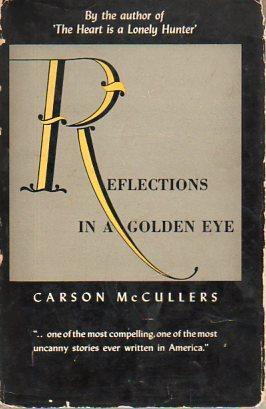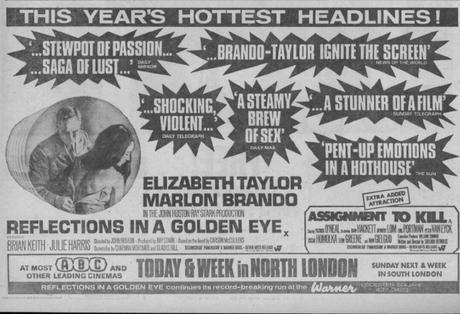Book Review by George Simmers: Reflections in a Golden Eye is set on an isolated American army base, and like a classical tragedy brings together a group of characters in such a way that their juxtaposition brings out the worst in each other, with terrible consequences. The genre is Southern Gothic - as in the plays of Tennessee Williams, the characters are the victims of their passions and repressions.

The novel centres on two marriages. Major Langdon is married to a rather feeble hypochondriac. Captain Pendleton is married to Leonora, a woman of strong sexual appetites. Perhaps inevitably, before the novel begins, the Major and Leonora, are having a sexual affair. Their spouses know this but do nothing.
McCullers seems less interested in the adulterous couple than in their spouses, who are more complicated. Alison is an invalid, distanced from her husband, but of all the characters the most aware of what is going on around her. . Is the a hypochondriac or really ill? Or both? We are never totally sure. Her closest relationship is with her epicene Filipino servant Anacleto; it is a joyous relationship, perhaps because it is undisturbed by sexual feeling.
It is Captain Pendleton who comes in for the closest analysis; McCullers describes him in terms that were a 1940s code for homosexuality.
"Sexually the Captain obtained within himself a delicate balance between the male and female elements, with the susceptibilities of both the sexes and the active powers of neither."
The Captain is deeply repressed; because he does not understand his feelings he is oppressed by them:
Also there are times when the irritations, disappointments, and fears of life, restless as spermatozoids, must be released in hate. The unhappy Captain had no one to hate and for the past months he had been miserable.
One way in which he resolves his repression is kleptomania. We are told that he is constantly repressing the urge to steal things. At a wedding party he cannot resist the urge to pocket 'an unusual and beautiful little dessert spoon, delicately chased and very old.' Unfortunately, 'When after some skilful manipulation he had his booty safe in his pocket, he realized that Alison, who was next to him, had seen the theft. She looked him full in the face with the most amazed expression.' This produces a strange perverse bond between the two of them.
McCullers has read her Freud, or at any rate those Freudian commentators from the 1940s who linked homosexuality with sadism and kleptomania: in one disturbing passage are told about the winter's day that the Captain found a stray kitten:
"On the corner there was a mailbox and after one quick glance around him he had opened the freezing letter slot and squeezed the kitten inside. Then he had continued on his way."
McCullers editorialises about her characters - especially the Captain - in a way that reminded me of D.H. Lawrence:
"But in spite of his knowledge of many separate facts, the Captain never in his life had had an idea in his head. For the formation of an idea involves the fusion of two or more known facts. And this the Captain had not the courage to do."
As well as the two couples, there is a fifth main character, Private Williams. He is outside their social circle, an observer. 'To this young Southern soldier the officers were in the same vague category as negroes - they had a place in his life, but he did not look on them as being human.' One day, Private Williams sees Leonora naked through a window, and he becomes obsessed by her; he takes to creeping into her house late at night going to her bedroom (she sleeps separately from the captain) and squatting down for a long while, just watching her sleeping.
The Captain, meanwhile, has seen Private Williams lingering nearby, and in turn becomes obsessed by him, in a way that he cannot fully understand - or maybe just prefers not to understand:
"For a long time now he had ceased to attribute his feeling for Private Williams to hate. Also he no longer tried to find justification for the emotion that had so taken possession of him. He thought of the soldier in terms neither of love nor hate; he was conscious only of the irresistible yearning to break down the barrier between them."
The tension is finally resolved in an act of violence, and then the book suddenly ends.
Reading this book, I wondered whether McCullers was presenting these quirky and obsessive characters as exceptional, or as typical of humanity. One passage, where she describes some of the other people on the army base, suggests that obsessions were everywhere:
"One old Corporal wrote a letter every night to Shirley Temple making it a sort of diary of all that he had done during the day, and mailing it before breakfast the next morning. Another man, who had ten years' service behind him, jumped out of a three-story window because a friend would not lend him fifty cents for a beer. A cook in the same battery was haunted by the fixed idea that he had cancer of the tongue, an illusion that no medical denials could dispel. He brooded before a mirror with his tongue out so far that he could see the taste-buds, and he starved himself to the point of emaciation."
Why is the book called Reflection in a Golden Eye? Two clues of sorts are given; the captain has taken Seconal (a barbiturate):
This quantity of the drug gave him a unique and voluptuous sensation; it was as though a great dark bird alighted on his chest, looked at him once with fierce, golden eyes, and stealthily enfolded him in his dark wings.
Later, the Filipino servant, staring into the embers of a fire, sees suddenly:
'A peacock of a sort of ghastly green. With one immense golden eye. And in it these reflections of something tiny and [...] grotesque.'
The idea obviously had a particular meaning for McCullers, though she doesn't share it with her readers. But then, this intensely written, and very absorbing, novel is full of mysteries. It seems to come from a dark place that McCullers is trying to define by putting it into words.

The novel was filmed in 1967 by John Huston, in a version that made it even more sensational (there is a scene where Leonora (Elizabeth Taylor) horsewhips the captain (Marlon Brando) that is not in the book). The film created a stir, but was not universally approved of in Yorkshire. The reviewer for the Huddersfield Daily Examiner called it a 'sordid slice of life redolent of a piece of rotten meat squirming with worms born out of a human soul's corruption.' You can't please everybody.
